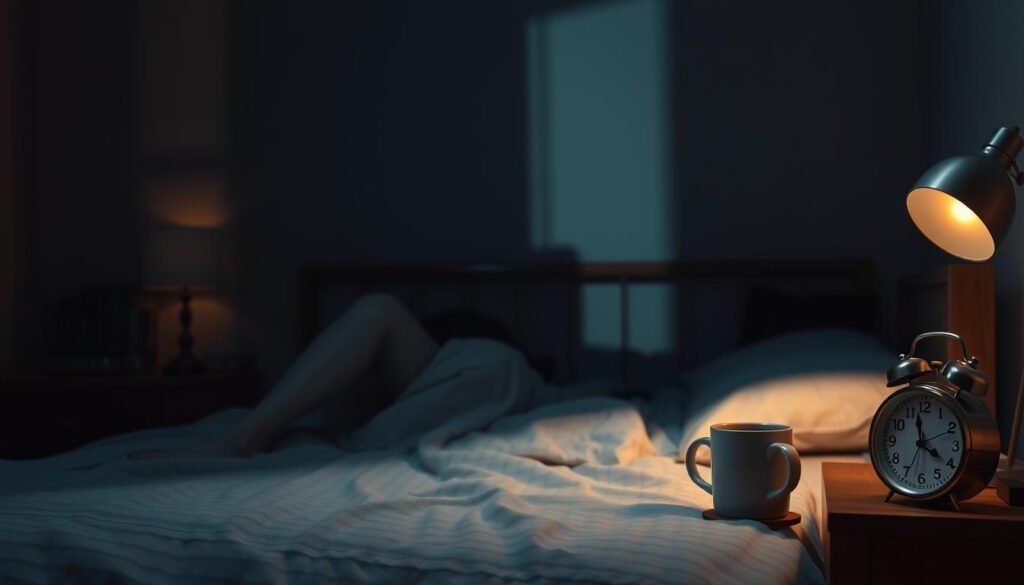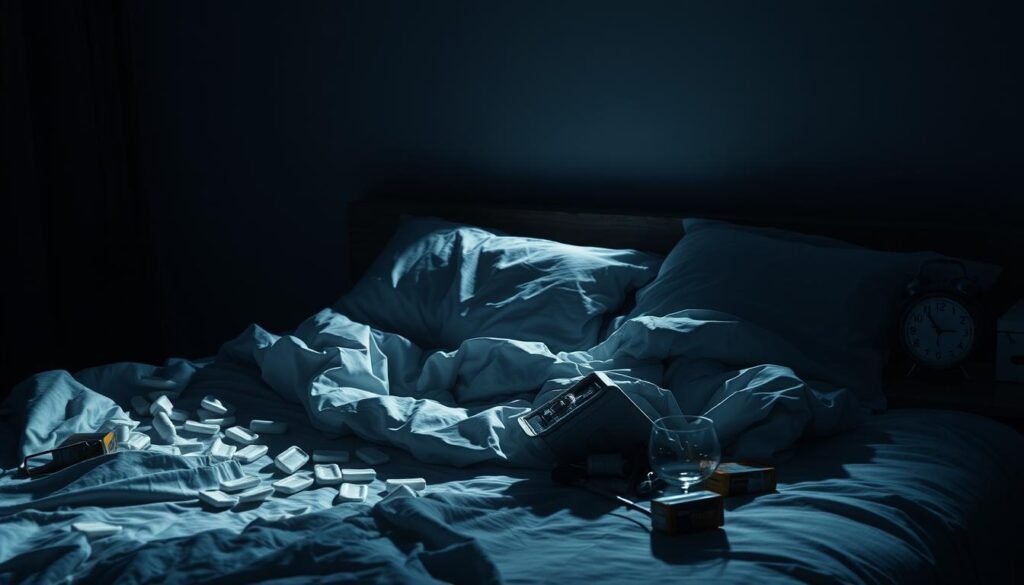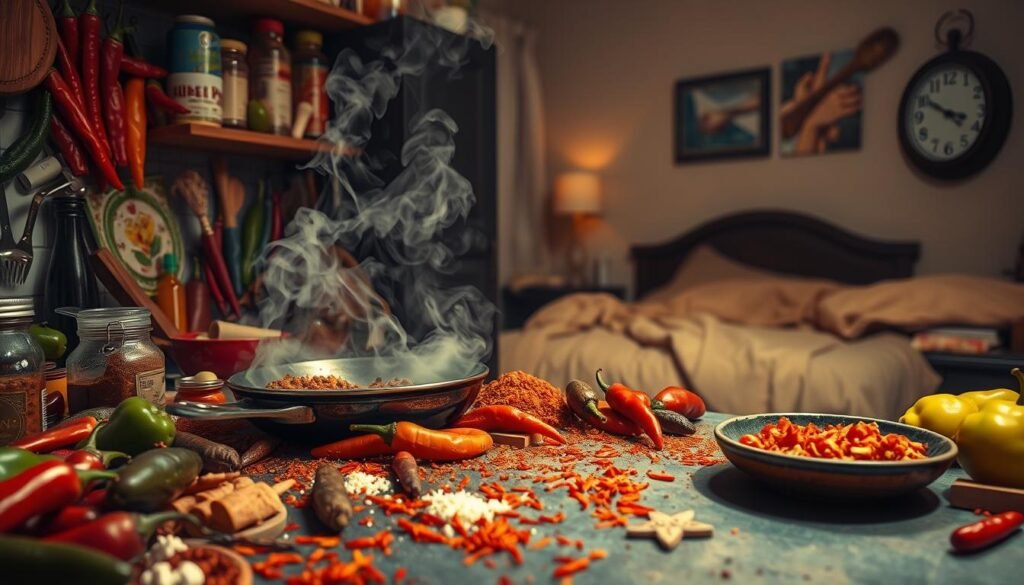Did you know nearly 60% of adults have sleep issues because of what they eat? This means the food you eat can really affect how well you sleep. It’s important to know how diet and sleep connect for anyone wanting better sleep. The wrong foods can mess with how long and well you sleep. This can leave you feeling tired instead of refreshed.
Making better food choices can help you sleep better. This improves your overall health. To learn more about which foods to avoid for good sleep, check out this article. Knowing which foods make sleep harder can help you rest better.
Key Takeaways
- Certain foods can really mess with how well you sleep.
- Better sleep often starts with what you eat.
- Knowing which foods to avoid can help you sleep better.
- Caffeine and sugar are big no-nos for good sleep.
- Not drinking alcohol before bed can improve sleep quality.
- Choosing the right foods can make you healthier overall.
Understanding Sleep Disruption
Sleep issues are on the rise in our busy world. Stress, noise, and even what we eat affect our sleep. These factors can make it hard to sleep well, leading to health problems later.
Our sleep is controlled by neurotransmitters and our body clock. They tell us when to sleep and wake up. When these signals get messed up, sleeping becomes tough.
Eating habits are also key to good sleep. Eating too much late at night or consuming caffeine can ruin sleep. These habits keep us awake when we should be sleeping.
By understanding what affects our sleep, we can make better choices. Changing our lifestyle can improve our sleep quality. This means we can enjoy better health and wellbeing.
| Factors Affecting Sleep Disruption | Examples | Possible Effects on Sleep Quality |
|---|---|---|
| Stress | Anxiety, Work pressure | Difficulty falling asleep, Frequent awakenings |
| Environmental Factors | Noise, Light | Increased chances of interruptions throughout the night |
| Diet | Caffeine, Heavy meals | Restlessness, Reduced deep sleep |
| Health Conditions | Sleep apnea, Depression | Chronic sleep disturbances, Exhaustion during the day |
Common Culprits: Caffeine and Sleep
Caffeine is a popular stimulant that boosts energy and alertness temporarily. But, it can drastically affect sleep quality, leading to tough mornings and sleepless nights. Knowing how caffeine changes sleep patterns is crucial. This involves looking at its biological impact and when people drink it.
How Caffeine Affects Sleep Quality
Caffeine messes with sleep by blocking adenosine receptors. Adenosine is a chemical that makes you sleepy. By stopping its effects, caffeine keeps you awake longer. Its half-life means it stays in your system for hours. This makes it hard to fall and stay asleep, leading to poor sleep quality.
Time of Consumption Matters
When you have caffeine is key to how well you sleep. It’s best to avoid caffeine in the late afternoon or evening. Drinking it late can mess with your sleep big time. Being smart about when you have caffeine can improve your sleep and overall health.

The Role of Alcohol in Sleep Disturbance
Many people think drinking helps them sleep better. But, having alcohol before bed can really mess up your sleep. Drinking impacts sleep quality right away, especially by breaking up your sleep cycle. Knowing this can help you choose better night routines.
What Happens When You Drink Before Bed?
Drinking alcohol before sleep changes how your body rests. It messes with sleep stages, causing you to wake up more often and cuts down on deep REM sleep. This leads to:
- Increased sleep fragmentation
- Disruption of breathing patterns during sleep
- Interference with circadian rhythms
Your sleep doesn’t just suffer for one night. Making a habit of drinking before bed can drop the quality of your sleep big time. To avoid these issues, don’t drink alcohol three hours before bed. For more details, check out Sleep Foundation.
Long-term Effects of Alcohol on Sleep Patterns
Drinking a lot over time can cause ongoing sleep troubles, like sleep apnea. People might not notice that drinking at night affects their sleep both now and later. Some long-term impacts are:
| Type of Effect | Description |
|---|---|
| Chronic Sleep Disturbance | Often waking up and hard to fall back asleep. |
| Reduced Sleep Quality | Less restful sleep, making you tired during the day and less sharp mentally. |
| Exacerbation of Disorders | Makes symptoms of sleep problems like insomnia worse. |
Understanding how alcohol affects sleep can help improve your sleep habits. If sleep issues are a concern, think about your drinking habits. It’s key to make a bedroom that promotes good sleep, free from alcohol’s effects.

Spicy Foods: A Double-Edged Sword
Spicy foods can bring exciting flavors to our meals. Yet, eating them can affect our sleep. Eating spicy meals, especially before bed, might make our body temperature go up. This can lead to heartburn, indigestion, or discomfort. Such issues can make it hard to get a good night’s sleep.
Some people can handle spicy foods well, but others might not sleep as well after eating them. This difference shows how important it is to know how spicy foods affect us. It’s wise to be careful about what we eat late at night.

Choosing less spicy meals in the evening can help us sleep better. This way, we can enjoy tasty foods without losing sleep. Paying attention to how spicy foods affect our sleep can guide us. It helps in picking meals that are good for our digestion and sleep.
How Sugary Snacks Affect Sleep
Many people love sugary snacks for a quick energy boost. Yet, these sweet treats can harm sleep quality. Eating them often can lead to a sugar crash. This crash can cause mood swings and energy dips that interrupt sleep. High sugar intake from snacks is linked to worse sleep. It affects melatonin production, the sleep hormone.
The Sugar Crash Phenomenon
After eating sugary snacks, you might feel a quick energy boost. But soon, a sugar crash follows, making you feel sleepy, irritable, and unfocused. At night, this disrupts your sleep cycle. It leads to waking up often and poor sleep. The body struggles to keep energy levels steady, impacting rest. Research, including a study on university students, shows sugar affects sleep quality badly. For more details, check this research article.
Alternatives to Satisfy Sweet Cravings
Finding healthy sleep alternatives to sugary snacks promotes better sleep. Here are some options:
- Fresh fruit: Bananas or berries are naturally sweet and have fiber. They satisfy your sweet tooth without blood sugar spikes.
- Dried fruit: A small serving of unsweetened dried fruit gives sweetness and nutrients.
- Dark chocolate: It’s a low-sugar and antioxidant-rich treat, good in small amounts.
- Nuts and seeds: They offer healthy fats and proteins for balanced energy levels.
Choosing these alternatives helps prevent sugary snacks’ negative impact on sleep. It ensures restful nights.
Fatty Foods and Sleep Quality
Heavy meals full of fats can mess with how well you sleep. Eating them before bed often causes digestive problems. This makes it hard to get a good night’s rest. Your body struggles to digest high-fat foods quickly, leaving you feeling stuffed and uncomfortable. This can stop you from falling asleep easily.
Studies show that what and when you eat at night matters a lot for your sleep. Eating fatty foods late can lead to more stomach issues. This often shows up as heartburn or indigestion, messing up your sleep rhythms.
To sleep better, it’s smart to look at how fatty foods, digestion, and sleep all connect. Choosing lighter evening meals and staying away from fats before bed can help a lot. These steps can lead to better sleep habits.
| Type of Fatty Food | Impact on Digestion | Effect on Sleep Quality |
|---|---|---|
| Fried Foods | Slow to digest | Increases discomfort, leads to restless sleep |
| Cheese and Cream | Can cause bloating | May lead to interrupted sleep |
| Processed Meats | High in saturated fats | Associated with poor sleep quality |
| Pastries and Snack Foods | Heavy and high in trans fats | Can affect sleep duration and quality |
Acidic Foods: The Hidden Sleep Thief
Eating acidic foods can be a big problem for those wanting good sleep. These foods cause acid reflux, which makes them a sleep thief.
Foods to Watch Out For
Some acidic foods to avoid are:
- Citrus fruits like oranges and lemons
- Tomato-based products, including sauces and juices
- Carbonated beverages
- Vinegar and pickled foods
Eating these foods before bed can make you uncomfortable and ruin your sleep. It’s key to know what foods can disturb your sleep.
Addressing Acid Reflux and Sleep
Dealing with acid reflux is important for restful sleep. It’s advised to avoid acidic foods at night. Try alkaline foods like bananas, oatmeal, or non-citrus fruits instead.
Changing your diet to include these foods can boost sleep quality. It helps your overall health too.
For more insights on sleep disruptors, explorethis resource. It can help you understand different sleep thieves.
Hydrating Beverages: A Double Edge
Keeping your body hydrated is key for good health. But, when and what you drink can really affect how well you sleep. Drinking enough during the day is important, but some drinks before bed can mess up your sleep.
Caffeine in coffee and energy drinks can keep you awake. It makes it hard to fall asleep or stay asleep. Alcoholic drinks might make you feel sleepy at first, but they can break your sleep cycle as your body works off the alcohol.
It’s all about finding the right balance. Try herbal teas or drinks without caffeine in the evening. These choices help you stay hydrated and can relax you before sleep. Knowing how drinks affect sleep lets you make better choices at night.
Finding out how to improve sleep by avoiding certain drinks before bed is key. And if you’re curious about how food affects sleep, this article has some great info.
| Type of Beverage | Impact on Sleep | Recommended Timing |
|---|---|---|
| Caffeinated Drinks | Can delay sleep onset | Avoid within 6 hours of bedtime |
| Alcoholic Drinks | May disrupt sleep cycles | Avoid close to bedtime |
| Herbal Teas | Promote relaxation | Safe at bedtime |
Foods That Disrupt Sleep: A Comprehensive List
Knowing which foods harm sleep is key to better rest. This list includes caffeine, alcohol, spicy foods, and sugary treats. They affect how your body relaxes and gets ready for sleep. It’s crucial to know how these foods can harm your sleep quality.
Other Common Offenders
Other foods to watch out for are high-fat meals, chocolate, and citrus fruits. High-fat meals may lead to discomfort at night by slowing digestion. Chocolate can keep you awake, especially if it has caffeine. Citrus fruits might cause acid reflux, making it hard to sleep well. Knowing these foods helps you choose better at night.
Understanding Individual Responses
People react differently to these foods. One might struggle with dairy, while another sleeps fine. Keeping a journal of what you eat and how you sleep can help. This helps you find what hurts your sleep. With this info, you can pick foods that help you sleep better.